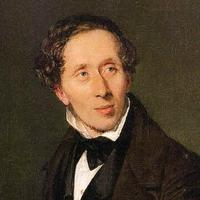The shoes of fortune, II. What Happened to the Councillor, part 4
Those persons who were sitting nearest him and heard his speech, stared at him in wonderment; and one of them rose, took off his hat respectfully, and said with a serious countenance, "You are no doubt a very learned man, Monsieur." "Oh no," answered the Councillor, "I can only join in conversation on this topic and on that, as indeed one must do according to the demands of the world at present." "Modestia is a fine virtue," continued the gentleman; "however, as to your speech, I must say mihi secus videtur: yet I am willing to suspend my judicium." "May I ask with whom I have the pleasure of speaking?" asked the Councillor.
"I am a Bachelor in Theologia," answered the gentleman with a stiff reverence. This reply fully satisfied the Councillor; the title suited the dress. "He is certainly," thought he, "some village schoolmaster--some queer old fellow, such as one still often meets with in Jutland." "This is no locus docendi, it is true," began the clerical gentleman; "yet I beg you earnestly to let us profit by your learning. Your reading in the ancients is, sine dubio, of vast extent?" "Oh yes, I've read something, to be sure," replied the Councillor. "I like reading all useful works; but I do not on that account despise the modern ones; 'tis only the unfortunate 'Tales of Every-day Life' that I cannot bear--we have enough and more than enough such in reality." "'Tales of Every-day Life?'" said our Bachelor inquiringly.
"I mean those new fangled novels, twisting and writhing themselves in the dust of commonplace, which also expect to find a reading public." "Oh," exclaimed the clerical gentleman smiling, "there is much wit in them; besides they are read at court. The King likes the history of Sir Iffven and Sir Gaudian particularly, which treats of King Arthur, and his Knights of the Round Table; he has more than once joked about it with his high vassals." "I have not read that novel," said the Councillor; "it must be quite a new one, that Heiberg has published lately." "No," answered the theologian of the time of King Hans: "that book is not written by a Heiberg, but was imprinted by Godfrey von Gehmen." "Oh, is that the author's name?" said the Councillor. "It is a very old name, and, as well as I recollect, he was the first printer that appeared in Denmark." "Yes, he is our first printer," replied the clerical gentleman hastily.

